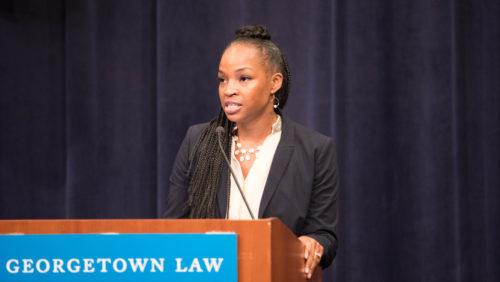The high percentage of politicians who are no longer in office following allegations of sexual assault represents an unprecedented degree of political accountability, according to a Georgetown University Law Center professor’s research.
Associate Professor of Law Jamillah Bowman Williams and her team of researchers examined the 138 elected and appointed officials accused of sexual misconduct in the last election cycle and whether or not they will still remain in office by January 2019. Of those accused, 18 were accused in the months prior to the start of the #MeToo movement and 120 after the allegations against Harvey Weinstein first broke in October 2017. Of those accused of sexual misconduct in the past election cycle, 75 percent will no longer be in office in January 2019.
These accusations, which were mostly made against male officials, had an impact on the midterm elections, according to the group’s research. Many of those politicians who had accusations made against them stepped down or were removed from office before the elections.
Of those who did not leave office before the midterm elections, many lost their primaries. However, for the officials who did make it to the general election, more won their elections than lost, the research posited.
Bowman, whose research focuses on racial and gender inequality in the workplace, became interested in tracking the impact of the #MeToo movement on political accountability.
“We have been analyzing over 12 million tweets with the hashtag #MeToo to examine the nature of the conversation around sexual harassment and assault on social media, and to investigate the extent to which the movement is leading to lasting social, political, and cultural change,” Bowman wrote in an email to The Hoya. “I thought it would be interesting to collect data on the government officials reported for sexual misconduct before and after #MeToo exploded on Twitter in October 2017. I wanted to examine whether the movement was influencing reporting and accountability.”
The group gathered data through the use of online searches of internet archives, according to Bowman.
“Using LexisNexis, GoogleNews and NewspaperArchive, we performed a series of searches based on a series of keyword phrases and indexed subject terms,” wrote Bowman.
The search was limited to online and print newspapers and publications from the United States.
“We reviewed the articles and coded key information such as: date reported, type of allegation, position of government official, state, political party, gender, and employment status.”
Bowman is unsure of the future of this trend, but she intends to continue her research as the #MeToo movement continues to have an impact. Currently, the team is continuing to collect data to determine if the trend was a short-term reporting spike as #MeToo gained momentum or if it will be a lasting trend.
“For example, the volume of accusations hit a low point in October 2018 following the highly publicized Kavanaugh hearings and his subsequent confirmation to the Supreme Court. Victims may have been discouraged by that outcome,” Bowman wrote. “However, the #MeToo movement still has strong momentum overall, so it is very possible that there will be another surge.”





















